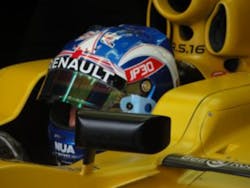YXLON provides CT system to Renault Sport Formula One Team
Enstone, UK, and Hamburg, Germany. YXLON International, a producer of X-ray and CT systems for industrial applications, and Renault Sport Formula One Team have announced the successful start of a technical partnership. YXLON has provided its Y.MU2000-D X-ray system to the Renault Sport Formula One Team, which can now use the system to conduct most of its inspection tasks for quality assurance and R&D.
To celebrate the official start of the partnership, YXLON’s UK agent invited a group of non-destructive test (NDT) users to visit Renault Sport Formula One Team’s Enstone Technical Centre, Oxfordshire. Dr. Nick Brierley, a senior research engineer at Manufacturing Technology Centre in Coventry, said. “It was a great introduction into how Formula 1 works. We learned a lot about the manufacturing challenges Renault Sport Formula One Team is facing.” Neil Smith from Grainger & Worrall Ltd, Motorsport Division, which uses YXLON CT Systems for engine parts, added, “…it was very interesting to understand the challenges of manufacturing a complete race car.”
The Y.MU2000-D expands the equipment of the Renault Sport Formula One NDT department, which is often active 24/7. The team is expecting benefits by using the system in the preparation phase and during the racing season.
Adrian Talbot, technical supervisor of the NDT department, explained the objectives Renault Sport Formula One Team aims to achieve with their new X-ray system: “By adopting digital radioscopy, our general NDT inspection process has become quicker and consequently we are able to turn cars around much faster between races. Most significantly, the Y.MU2000-D has improved the inspection process of our composite assemblies, which are inherently difficult to inspect using our current NDT methods. We now have the ability to document detailed images of assembly items preceding and post-race for further analysis and future development. With the use of 75-seconds-quick computed tomography, we will be able to give up cost-intensive disassembling of high-quality parts in the future.”
Nick Chester, technical director, added, “We will be able to significantly increase the quality of single components both during development and production. Structural analyses of various materials, including fiber composites or 3D printed components, damage analyses, and nominal/actual comparisons to CAD data, can be realized much faster and more precisely than with other technologies. This will have positive repercussions on the overall quality and safety of our racing cars but also help reduce costs and facilitate a faster deployment of technology innovation.”
The Y.MU2000-D has been used in multiple applications, including inspection of a large range of samples and materials in automotive, aerospace, and other industries. The Variofocus X-ray tube, which is used in the system supplied to Renault Sport Formula One Team, extends the bandwidth of inspection parts thanks to the scalable focal spot ranging from 250 µm at 290 W up to 800 µm at 1,600 W, with optimum detail detectability. The Variofocus X-ray tube is finds use in the aerospace industry thanks to its flexibility and power to penetrate thick materials like aluminum or Inconel. The CT function enables the operator to easily and quickly change from digital radioscopy (DR) to 2D and 3D computed tomography in order to obtain more detailed information about material, defects and inner structures.

